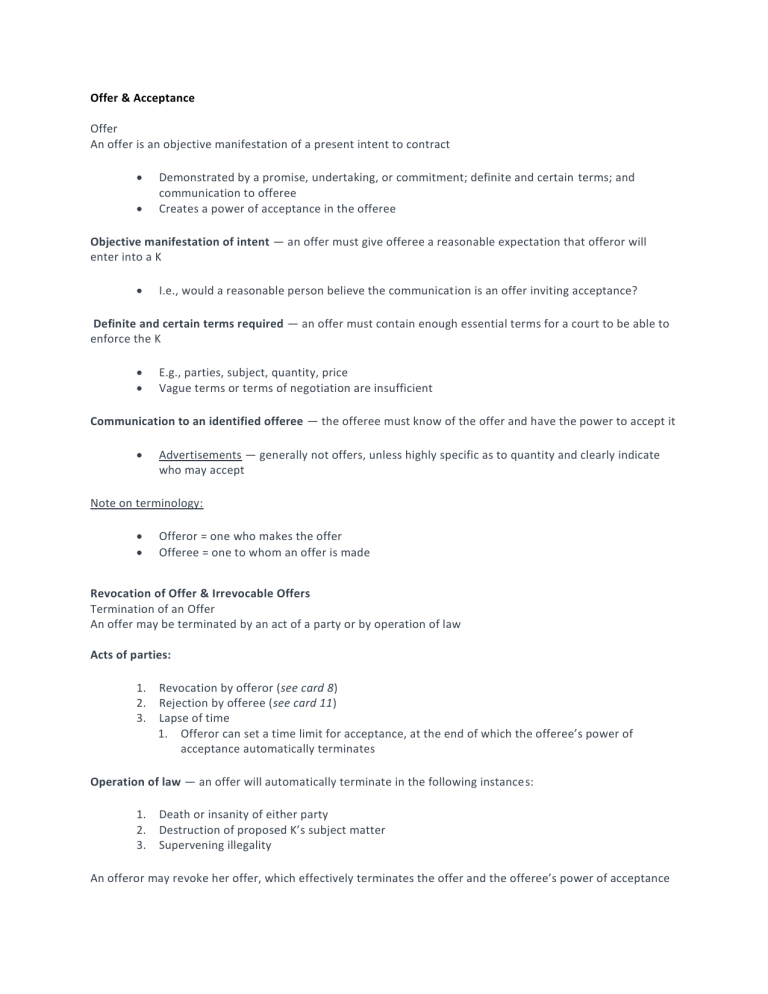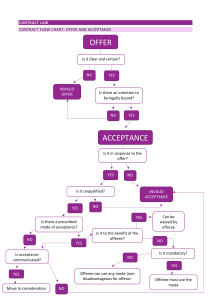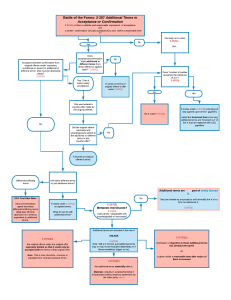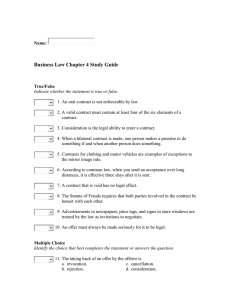
Offer & Acceptance Offer An offer is an objective manifestation of a present intent to contract Demonstrated by a promise, undertaking, or commitment; definite and certain terms; and communication to offeree Creates a power of acceptance in the offeree Objective manifestation of intent — an offer must give offeree a reasonable expectation that offeror will enter into a K I.e., would a reasonable person believe the communication is an offer inviting acceptance? Definite and certain terms required — an offer must contain enough essential terms for a court to be able to enforce the K E.g., parties, subject, quantity, price Vague terms or terms of negotiation are insufficient Communication to an identified offeree — the offeree must know of the offer and have the power to accept it Advertisements — generally not offers, unless highly specific as to quantity and clearly indicate who may accept Note on terminology: Offeror = one who makes the offer Offeree = one to whom an offer is made Revocation of Offer & Irrevocable Offers Termination of an Offer An offer may be terminated by an act of a party or by operation of law Acts of parties: 1. 2. 3. Revocation by offeror (see card 8) Rejection by offeree (see card 11) Lapse of time 1. Offeror can set a time limit for acceptance, at the end of which the offeree’s power of acceptance automatically terminates Operation of law — an offer will automatically terminate in the following instances: 1. 2. 3. Death or insanity of either party Destruction of proposed K’s subject matter Supervening illegality An offeror may revoke her offer, which effectively terminates the offer and the offeree’s power of acceptance Notification required — revocation is only effective when the offeree receives notification of the revocation An offer cannot be revoked once it has been accepted Methods of revocation — an offer may be revoked if: a. b. Offeror makes an unambiguous statement of revocation to the offeree, or Offeree becomes aware of unambiguous conduct by offeror indicating an unwillingness or inability to contract 1. E.g., offeror makes the same K with another party Irrevocable offers — an offer may become irrevocable where: Detrimental reliance — if an offeree detrimentally relies on an offer, it is irrevocable for a reasonable time 1. Reliance must be reasonable Unilateral Ks — start of performance makes the offer irrevocable for a reasonable time to complete performance 1. Performance must go beyond mere preparation Option Ks and UCC firm offers — see card 9 Option Contracts & Merchant’s Firm Offer Offers involving option Ks and merchant’s firm offers have limitations on their revocability Option K — a promise by offeree to not revoke a standing offer I.e., a promise by offeror to keep the offer open for offeree Consideration required from the offeree, which in itself forms a separate K 1. E.g., offeree gives offeror $200 to keep the offer open for two weeks The offer is irrevocable for the given time period or an otherwise reasonable period Merchant’s firm offer (UCC) — a merchant can offer to buy or sell goods in a signed writing that provides assurances that the offer will be held open Offer is irrevocable for the time stated or a reasonable time not to e xceed three months No consideration required (distinguish from option Ks) UCC Offers & Requirement & Output Contracts In a sale of goods K under the UCC, the offer must contain a stated quantity that is certain or capable of being made certain Missing terms — may not prevent K formation for UCC offers Missing terms will not prevent K formation if: 1. Parties intended to make a K; and 2. There is a reasonably certain basis for giving a remedy The more terms that the parties leave open, the less likely it is that they intended a binding agreement See Card 30 - UCC Gap-Filler Terms Requirement and output Ks — Ks in which the stated quantity is not required Requirement K — buyer promises to purchase from seller all goods buyer requires, which seller promises to provide Output K — seller promises to sell to buyer all the goods that seller produces, which buyer agrees to purchase Quantity is sufficiently definite b/c it is capable of being made certain by reference to seller’s output and/or buyer’s requirements 1. Limitation — any change in quantity cannot be unreasonably disproportionate to any stated estimate or otherwise prior quantities Rejection of Offer A rejection by offeree terminates the offer as well as the offeree’s power of acceptance Methods of rejection: 1. 2. 3. 4. Express rejection — offeree expressly rejects the offer Counteroffer — offeree makes a new offer concerning the same subject matter but with different terms Terminates the original offer Bargaining vs. counteroffer — inquiring or bargaining about an offer’s terms will not, on its own, terminate an offer unless a reasonable person would believe the offer had been rejected Conditional acceptance — an acceptance followed by terms such as “only if,“ “so long as,” etc. terminates the original offer and becomes a new offer and/or counteroffer Acceptance with additional terms Acceptance must mirror the offer under common law E.g., A sends lease for B to sign, which is silent re payment of utilities; B writes in language to the K No K has been formed under common law Under UCC Article 2, acceptance that does not mirror the offer may be valid for K formation (see cards 13-14) See Card 12 - Acceptance Acceptance A clear expression of assent to the terms of an offer General requirements: “Mirror Image” rule — for common law Ks, acceptance must mirror the offer’s terms; it cannot omit or add new terms 1. For UCC Ks, acceptance with different terms may be valid (see cards 13-14) Who may accept — generally only the party to whom the offer is addressed or directed may accept Acceptance of offer for bilateral K — accepted by unequivocal promise to perform or the beginning of performance Acceptance generally must be communicated to offeror in any reasonable manner under the circumstances, unless otherwise required by the offer 1. An objective manifestation of a counter-promise by the offeree is usually sufficient Acceptance of offer for unilateral K — accepted by completion of performance Notice of acceptance generally not required See Card 16 - Acceptance by Performance See cards 13-14 on UCC Acceptance UCC Acceptance Issues For sale of goods Ks under the UCC, acceptance does not always have to match the offer UCC: Acceptance with additional terms — an acceptance that proposes additional or different terms from those offered operates as a valid acceptance, unless it expressly requires assent to the additional terms Effect — additional or different terms will be considered proposals to modify the K; they do not become part of the K unless the offeror expressly agrees Where both parties are merchants — additional terms become part of the K unless they materially change the offer or offeror objects within a reasonable time ( see card 14) UCC: Acceptance by prompt shipment — a merchant may accept an offer to buy goods by either: a. b. Providing a promise to ship goods (usually by written confirmation), or Promptly shipping conforming goods 1. Shipment of nonconforming goods may give rise to breach (see cards 32-34) Mailbox Rules Offers and acceptances transmitted via mail or other similar methods become effective upon either dispatch or receipt Offers — effective upon dispatch, i.e., when sent by offeree Acceptance — effective upon receipt, i.e., when received by offeree Limitations: If the offer stipulates that acceptance is not effective until received, the offer controls 1. I.e., offeror can opt out of mailbox rules Option Ks — acceptance is effective upon receipt If offeree sends both a rejection and acceptance, the first to arrive is controlling Mailbox Rules Instantaneous communication — if offer and/or acceptance is via instantaneous two-way communications (e.g., phone), it is treated as if the parties are in each other’s presence Revocation — mailbox rules do not apply Revocation is effective only upon receipt Acceptance by Performance An offeree may accept by partial performance (for bilateral Ks) or complete performance (for unilateral Ks), unless acceptance is limited by the offer’s terms Unilateral Ks — complete performance required Offeree is not obligated to complete performance Offeree’s failure to perform does not constitute a breach (b/c no K is formed absent complete performance) Offer may become irrevocable upon the start of performance until completion Notice — offeree is not required to give notice upon start of performance, but must notify offeror within a reasonable time upon completion Bilateral Ks — partial performance gives rise to acceptance Offeree must make offeror aware of acceptance Note — an offer may always limit methods of acceptance . Contract Interpretation A. Happens when there is a disagreement of the words of the contract B. If there's no clear understanding between the parties, courts sometimes hold no contract consensus ad idem C. Cases: i. Lucy v. Zehmer 1. Approached to buy farm multiple times, Zehmer supposedly agreed as a joke 2. No joke rule: no person can claim the act was made in jest when their conduct and words would warrant a reasonable person in believing that they intended a real agreement a. Courts look to the outward manifestation, not inward subjective intent 3. Zehmer's outward manifestation appear that he was serious a. The more effort you take to make the joke look serious the more serious a court will consider your intent 4. Restatement 12: no one can be bound when they don't have the capacity a. People who fall into this category: under guardianship, infant (<18) mentally ill, intoxicated 5. Restatement 16: a person incurs only voidable contractual duties by entering into a transaction if the other party HAS REASON TO KNOW THAT BY REASON OF INTOXICATION: a. The party is unable to understand the nature and consequences OR b. The party is unable to act in a reasonable manner in relation to the transaction c. Have to be so drunk that you don't know what you're signing ii. Raffles v. Wichelhaus 1. Contract to sell cotton a the ship "Peerless" arriving in October 2. 3. 4. 5. D. Seller thought it meant the Peerless arriving in December Meanings are so far apart that there was no contract Each party is equally justified in their view Restatement 20 a. There is no manifestation of mutual assent to an exchange if the parties attach materially different meanings to their manifestations and a. Neither party knows or has reason to know the meaning attached by the other or b. Each party know or has reason to know the meaning attached by the other b. The manifestations of the parties are operative in accordance with the meaning attached to them by one of the parties IF a. That party doesn't know of any different meaning attached by the other and the other knows the meaning attached by the first party or b. That party has no reason to know of any different meaning attached by the other and the other has reason to know the meaning attached by the first party iii. Frigaliment v. BNS International Sales 1. What does chicken mean? Buyers thought broiler chickens, sellers thought frying chickens 2. Things to consider when interpreting a contract a. Negotiations - context and pre-negotiation period b. Whole contract c. Trade usage d. Government standard 3. Restatement 201 a. When parties give the same meanings to a word, this meaning will be used b. When parties attach different meanings, the court will interpret the meaning as attached by one party if: a. One party didn't know of any other different meaning and the other party knew of the other parties' meaning b. One party didn't know of any other different meaning and the other party had reason to know of the other parties' meaning iv. If neither party knew of the meaning of the other and didn't have reason to know, courts will say no contract 1. Peerless example, Wichelhaus v. Embry v. H-M Dry Goods 1. Dispute about whether the 1-year employment contract was renewed 2. Sidenote: a. SOL doesn't apply if the contract created Dec 23 b. 1-year employment so not employment at will 3. Jury should have been instructed to consider where the employers outward conduct induced a reasonable person to believe the contract was renewed vi. Morales v. Sun Construction 1. Spanish speaking, signed a contract in English, had an interpreter who didn't explain the arbitration clause 2. Absent fraud, not reading the contract will not be reason to rescind 3. Signature is outward manifestation of assent Plain meaning of language i. Spaulding v. Morse 1. ii. iii. Divorce agreement where the father had to pay 100/month until Richard entered college, then 200/month while he was in college 2. Richard was drafted, does the father have to pay during this time? 3. Court reads a general purpose into the contract - care and maintenance of Richard a. Because the army was "caring" for Richard, the dad doesn't have to pay while Rich is in the army 4. If applying the plain language frustrates the main purpose of the contract, the contract should be interpreted considering the main purpose a. Contracts don't always think of every single possibility Beanstalk v. AM General 1. Licensing agreement where Beanstalk gets 35% from all trademark agreements, AM sell to GM 2. General principle is that you construe the meaning against the drafter a. Here both had equal bargaining power so this isn't needed 3. Principle 1: if plain meaning works absurd results, don't apply 4. Principle 2: the contract will be interpreted as a whole - sentence give meaning to other sentences Lawson v. Martin 1. Example of where this can go bad 2. One year extension if there is high water during the 2 year period and there was 3. Court decides that the purpose of the 1 year extension was to give extra time IF THEY NEEDED IT a. Could still get timber off of the land in time b. Who's to say they didn't bank on having an extra year to remove the timber? OFFER · · · What Constitutes an Offer? o Manifestation of a willingness to enter into a bargain; offeror understands that the response from the offeree will make the contract (or deny it) o Have an offer if you can confidently conclude that the contract forming power has been handed over to the other party (the offeree) to decide if there is going to be a relationship (acceptance) · Restatement 24 Acceptance has to mirror offer otherwise it is a counteroffer and the original offer disappears o Exceptions to mirror image: · Mere inquiry · Not a material change · Acceptance under protest (I accept but I don’t like it) Termination of the Offeree's Power of Acceptance: o Lapse · Expiration at a fixed time stated in offer OR after a reasonable amount of time if not stated o Rejection· if offeree rejects offer · All about the offeror's perception of offeree · Time: if it seems to the offeror that their offer is rejected even before the allotted time to accept would have lapsed on its own, then the offer is revoked and cannot be accepted. · Examples: · Akers v. J.B. Sedberry, Inc. · Ps worked for D company and offered their termination when they found out company was struggling. Offers were not accepted at the time of faceto face convo and Ps assumed they were rejected. D later "accepted" via letter and stopped paying them their salaries · RULE: offer is rejected when the offeror reasonably infers from the offerees words or conduct that she does not accept the offer or is not considering the offer further. · Ardente v. Horan · Ps sent bid on home with deposit and a condition to be met: we will buy IF certain furniture left in house. Ds refused and denied purchase. · RULE: A valid acceptance that is capable of forming a valid contract must be definite and unequivocal and must not impose additional conditions or limitations on the offer, unless such conditional language is clearly independent of the actual acceptance. · Conditional acceptance terminates the power of acceptance · Mirror image rule o Counter-Offer · if offeree counter-offers, original offer terminates · if A offers to sell land for $5000 and B says "ill buy it for $4800" and A rejects, B cannot then accept the original offer unless A's response to the counter offer expressed the intention that his original offer still stood. · However, if instead B said "would you take less?" and A declines, B can still accept the original offer and his comment was not actually a counter offer o Revocation · Offeror can revoke the offer before offeree responds · Dickinson v. Dodds · Offeror expressed that he was selling home to someone else. Court held this was a revocation of the offer to the other party o ∆ gave a written offer to π to sell a certain property that stated the offer was “to be left open until 9 AM Friday.” π left acceptance with ∆’s mother-inlaw on Thursday upon learning ∆ was planning to sell the property to another person. π attempted to deliver his acceptance personally on Friday morning. ∆ refused stating that he already sold the property. o Holding: To constitute a contract, two minds must’ve been at one at the same moment. Π knew ∆ was no longer minded to sell him the property. Therefore, there was no meeting of the minds between the two parties and no binding contract. Also, there was no consideration given for keeping the offer open until 9 AM Friday. · An offer may be revoked by the offeror without an express or actual statement of revocation communicated to the offeree provided there has been no meeting of the minds and the offeree is aware of conduct by the offeror demonstrating intent to revoke the offer. · ****An offer can be revoked even if the offeror promises to hold open the offer unless the promise is supported by consideration or reliance. · In order for a promise to hold an offer open to be enforceable, the offeree must give some amount of consideration · Revocation and unilateral contracts (promise for performance) · if an offer for a unilateral contract is made, and part of the consideration requested in the offer is given or tendered by the offeree in response thereto, the offeror is bound by contract the duty of immediate performance of which is conditional on the full consideration being given within the time stated or within reasonable time if none stated · AKA UNILATERAL CONTRACTS ARE IRREVOCABLE WHEN PERFORMACE BEGINS · Beginning to perform different than preparing to perform · Ragosta v. Wilder · P sent offer to buy property. D said to accept, P would accompany D to the bank with the money in exchange for the deed (performance). D revoked offer to sell before performance was made. P argued he began performance · Court ruled loan acceptance was preparation to perform, not beginning to perform (loan app started before offer accepted) · Holding: No contract b/c π only prepared to accept ∆’s counteroffer; did not actually accept it · Preparation to perform is NOT the same as performance · Not revocable: reliance/ equitable estoppel Drennan v. Star paving co o P needed a subcontractor to help compete for a bid for construction contract for a school. D said they could do the paving for the project for a little over $7,000, which was the lowest bid/ helped P win the bid. When P informed D of the win, D admitted they made a mistake and could actually do it for $15,000. P refused and searched for many months for a new subcontractor that offered a little under $11,000. P sued D for dif between promised and what he actually got bc of promissory estoppel. o P's reliance made D's offer irrevocable o D should have reasonably expected P to rely on his bid. o P "bound himself to perform on D's terms" since his bid was accepted by the school. o RULE: An offer which the offeror should reasonably expect to induce definite and substantial reliance by the offeree, and which does induce such reliance is binding on the offeror and enforceable even without consideration if enforcement is necessary to prevent injustice to the offeree. Not revocable: Option contract § 1464-Eight, Lts. & Millis Management Corp. v. Joppich · Joppich purchased lot with option contract that said P could retake the property if not developed in 18 months. Not developed, P sued to retake, D said option contract had no consideration · RULE: Option contract becomes irrevocable when it is in writing, signed, and recites purported consideration and is not invalidated when the consideration is not actually delivered as nominal consideration is merely a formality and not necessary to hold agreements binding. · Holding: Signed writing is significant as a formality, but manual delivery is insignificant � therefore, even if nominal consideration is not delivered, the K is still enforceable. · An offer is irrevocable/enforceable if the offer is signed in writing, signed by the offeror, supported by consideration, and proposes a fair exchange to take place w/in a reasonable amount of time. · Nominal consideration = ok for option contracts. · · · When are offers not revocable: summary · Offerree relies-r estate 87 or 90 (estoppel) · Offeree begins performance (unilateral offers only)-restate 45 · Option is purchased- Joppich, (even nominal consideration) · UCC2-205 firm offer statue (must state offer is firm in terms) o Offer termination summary: · Expiration of a fixed time stated in offer · Expiration of reasonable time if no fixed time state · Death or incapacity of offeror · Rejection by offeree · Counteroffer · Revocation Advertisements as offers o Law usually sees ads as requests to make an offer and leaves the power with the store to create the contract. o Ads are not really offers bc the acceptance doesn't necessarily make the contract/ deal: if there are lots of items, maybe its first come first serve or limited quantity. o They are generally not seen to be offers (see Lefkowitz for exception) o Because over acceptance concern: if too many people accept the offer, this leads breach of contracts !!! o Example: o Lonergan v. Scolnick · D created an advertisement in paper to sell land for $2,500 minimum. The P (buyer) sent a letter to confirm that he was examining the correct lot of land. The defendant agreed that it was correct and warned him that he was going to sell the land quickly. P sent back a letter to buy the land, but D refused to sell. o Court held that the ad was simply a request for an offer and that the P and D had engaged in only preliminary negotiations; no offer had been made for the P to accept. o RULE: Property owner who asks another person if he is interested in purchasing the property has NOT, merely by asking, made an offer to the other person. o When an ad IS an offer o First come first serve: if store offers "first in line gets the deal" and someone is first in line, that’s an offer and acceptance and binding. o TEST: o Whether the facts show that some performance was promised in positive terms in return for something requested. Therefore, when the ad offers something clear, definite, explicit, and leaves nothing open for negotiation, it equals an offer which will create a contract when accepted. o Lefkowitz v. Great Minneapolis Surplus Store o D offered fur pieces for $1 for first in line. P accepted, but D said offer was for women only. o Court found offer had been made and accepted; cannot subject to house rules after acceptance o AD IS OFFER o Sateriale v. R.J. Reynolds Tobacco Company o ADVERTISEMENT PROGRAM o Cigarette company offered points to buy stuff from magazine with coupons found in cigarette boxes. D notified that program was ending in 2007, but ended it earlier in 2006. o Court held that there was a unilateral contract made by the offer of a limited number of certificates for acceptance. Since D had control over # of coupons sent, they had control over the number of acceptances. So, coupons = more than ads, they were offers. Consideration by the Ps was that they bought the Camel cigarettes. o Could have terminated whenever, but waived their right to terminate the offer whenever when they sent notice of date they would hold offer open. · Auctions o Usually bidders are the ones making the offer o Basic rule: an auctioneer putting an item up for sale is NOT an offer, but simply an invitation to bid § Usually not legally bound to sell an item if the highest bid is not satisfactory (with reserve) · This is the default rule of auctions: with reserve unless its stated that it is without reserve § Putting an item for sale "without reserve" means obligated to take the highest bid despite satisfaction of the offer § Reserve/ reservation price: lowest price seller will accept or highest price bidder is willing to pay o Auction place can have their own rules tho- if house says highest bid, highest bid. o Internet- site sets whatever terms they want · Rental car/ hotel/ restaurant reservations o Hotels= binding. You make the offer to reserve a room, they accept by saying yes to your offer. Hotel is not making the offer, the guest it. (fear of over acceptance) o Can reserve the right to cancel o Airline tickets: not guaranteed a seat even if they took your money already. They would have to pay you back tho if they cancel o Restaurants: idk about this, not binding? No consideration? ACCEPTANCE · offeror is the master of the offer!!! If they say they want this offer accepted a certain way, that’s how it must be accepted. · Form: · Keller v. Bones o D posted ranch for sale, P offered and gave deposit. Offer stated that if not accepted by 5 p.m. on 7/21, offer withdrawn. D's signed copy of acceptance and sent to their agent at 4:53 on 7/21, agent faxed at 5:12. Next day, another man offered to match Ps offer; Ds wanted to accept this one. Ps refused to release them from their agreement, Ds informed them they refused to sell. o Court held that there was communicated acceptance of the buyers' offer which established a binding contract because it was signed by the 5 p.m. deadline; the offer stated that the acceptance must be signed before then, not communicated. Also, communicated in "reasonable time" although 12 mins late. o NOTE: where offer is unilateral as it requires performance (communication of acceptance), acceptance doesn't begin when accepted but when offeror is notified. o Failure to receive notice not an excuse · Mailbox rule: o Acceptance effective when dispatched o Lost in mail? Still binding. o Revocation, rejection, counteroffers effective when received o Lost in mail? Not binding. o Example: o 9/2: offer sent o 9/5: offer arrives, acceptance mailed same day o 9/8: seller sells to someone else o 9/9: acceptance arrives at seller · (resell) · BINDING, seller breached bc acceptance made before revocation o Example: o 9/2: O mailed o 9/4: O revoked by mail o 9/5: O received and A mailed o 9/6: Revocation received · BINDING, acceptance sent before revocation received o Example: o 9/2: O mailed o 9/5: O received and rejection mailed o 9/6: A by fax (immediate) o 9/7: Rejection received · BINDING, acceptance sent before rejection received o Example: o 9/2: O mailed o 9/5: O received and rejection mailed o 9/6: A mailed o 9/8: Rejection received o 9/9: A received · BINDING, offeree changed mind, acceptance binding bc sent before rejection received · ***court could use estoppel here if offeror relied on the rejection and put seller in position of being misled by communications Critics of mailbox: o Why is the post office the agent for the offeror? o Once mailed, the offeree cannot get the acceptance back? o Offeree needs to know that it has contract so it can make plans? o Justification for this: Offeror could have provided otherwise; having not done so, offeror takes the risk · Offeror is the master of the offer: he can state terms in the offer to say otherwise: "I need to hear from you by certain date" can be specific in the offer!




